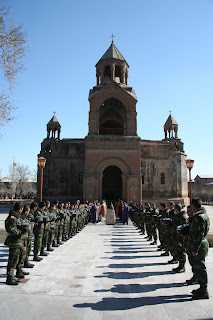Seeming Justice – Day 18 of 40
Armodoxy for Today: Seeming Justice – Day 18 of Lent
When we first began looking at the Parable of the Prodigal Son (Luke 15) a few days ago, we heard that the father had two sons. So far we’ve only looked at the dynamics between the father and the younger son, today, we meet the older brother.
Of the three characters in the parable, perhaps it is the older brother with whom we can best identify. Perhaps it is because, well, basically he is a good guy. He is a friendly guy. He is the one who did the right things and stayed faithful. He stayed home and did not squander his father’s money. He was loyal. He was obedient. But mostly we see in him the man, who like all of us, recognizes the unfairness of life. There was an injustice that was being played out because when the younger brother came home, there was celebration. It was almost as if he was being rewarded for his breach of discipline.
The older brother also asks questions that could have arisen out of simple jealousy. Why not me? Why is it that good things happen to bad people? Why are the actions of the bad person being rewarded while my goodness goes unnoticed? I have been loyal. I have been the model son any father would be proud of. Now this son of yours comes home, after squandering and abusing what you have given him. How can he be worth of the fatted calf? A celebration? The ring of authority on his hand? Simply: Why not me? Perhaps it is this expression that rings the bell of familiarity in all of us.
There are many examples of unfairness in our lives. Often, we see people who seemingly do not deserve to be rewarded, yet they are honored with privileges and celebrations. Why not me? is only a natural question to follow this inequity. Not only is it natural, it is logical if we believe good should be rewarded,
The father in the story gives a very simple answer. His is an answer that comes from the vantage point of parenthood. “Son,” says the father to his oldest, “I have always had you. Whatever I have is already yours. But this, my son, was lost and now he’s found; was dead and now he’s alive.” In so saying, the father is asking his son to see the bigger pictures. It’s not just about this moment, but there is a bigger “project” so to speak. Ultimately, God’s aim is to have us all His children reconciled with all of His creation. It’s about a state of love and harmony so that everyone may share that Kingdom.
Your act of charity today is to celebrate an event you would not otherwise celebrate. Fast for pride which causes jealousy and keeps you at a distance from loved ones. Perhaps begin your celebration with a Peach Cobler, today’s Lenten recipe, found below.
We pray with St. Gregory of Narek (53), The one who is afflicted and sighing you make happy. And the impudent you put in his place. And when our resources are exhausted
you perform the greatest miracles. For you forgive sins and erase our iniquity; you pardon our injustices and forget our sins as the prophets Isaiah and Jeremiah foretold. For all us sinners in our bewilderment, you remain the only condition for the good news.
To you with the Father and the Holy Spirit, glory and power forever. Amen. (Translated by Thomas J. Samuelian)
Lenten Recipes by Deacon Varoujan: Recipe 18: Peach Cobbler
Cover photo: K.T.Nalik 2009



